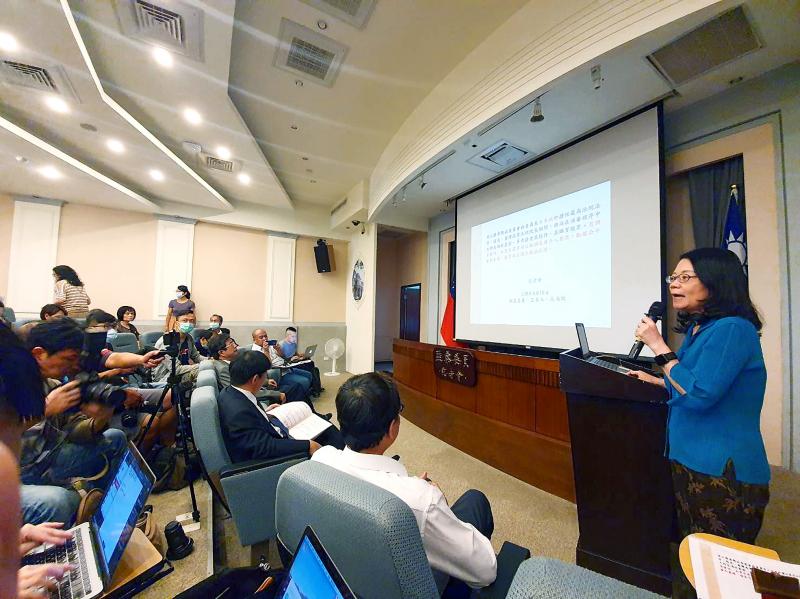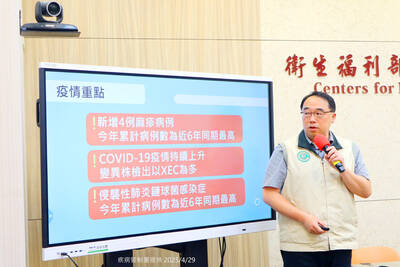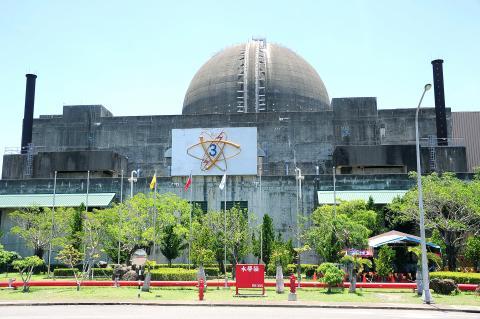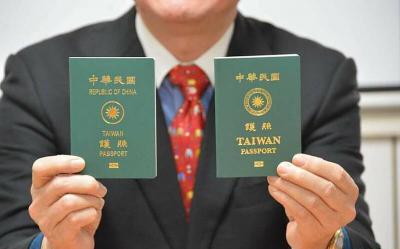Control Yuan members Wang Mei-yu (王美玉) and Kao Yung-cheng (高涌誠) yesterday said their investigation has found that former Commission on the Disciplinary Sanctions of Functionaries secretary-general Shih Mu-chin (石木欽) was involved in conflict of interest and insider trading for many years.
Shih was impeached last month by the Control Yuan.
Wang and Kao’s investigation began last year after Shih was accused of maintaining a friendship with Chia Her Industrial Co president Weng Mao-chung (翁茂鍾) even after Weng was embroiled in legal disputes.

Photo: Hsieh Chun-lin, Taipei Times
A Control Yuan investigation said that Shih did not recuse himself when Weng appeared before the court and had allegedly provided Weng with legal advice on the side.
Weng conducted illicit activities with more than a dozen high-level judicial and police officials for personal gain, the report said.
Shih, a Supreme Court judge until 2017, failed to recuse himself from the court’s cases involving Weng, despite their friendship, the investigation said.
The case has since embroiled judges, prosecutors and officials at the Ministry of Justice’s Investigation Bureau (MJIB).
Control Yuan member Fang Wan-fu (方萬富) has also been accused of wrongdoing.
Wang said the people involved in the case have contravened the Civil Servants Work Act (公務員服務法).
“This case has severely damaged our nation’s justice system, its reputation to carry out justice based on the principles of equality and fairness for all people, and eroded the public’s trust in the government,” Wang said.
“Therefore we recommend the Executive Yuan and the Judicial Yuan to carry out a thorough probe into the case, re-examine all the materials and evidence held at the Taipei District Prosecutors’ Office ... to verify unlawful conduct by the embroiled judicial and government officials.”
Wang also called on the two bodies to make their findings public, and dole out punishments in accordance with the regulations for public functionaries.
The investigation has found evidence of Shih made about NT$54 million (US$1.83 million at the current exchange rate) through insider trading of the shares of LandMark Optoelectronics and RF-Link System, both of which were controlled by Weng.
The latter was later renamed AVY Precision Technology upon listing on the Taiwan Stock Exchange.
The Control Yuan report said that the case dates back to 1995, when Weng was in litigation with the UK-based Barclays Bank over a US$10 million check.
Weng at the time treated Shih, as well as other senior judicial and government officials, to luxury banquets to build a good rapport, the report said.
Weng was “buying influence” with judges, prosecutors and police officials in a bid to secure favorable decisions in the Barclays case.
One of the rulings in the case was made at the Taipei District Court and appealed by the Taiwan High Court from late 1990s to 2000s, during which Weng built up his network of friends in the judiciary, the report said, adding that Weng provided them with financial benefits through insider trading of the shares of the companies controlled by Weng.
An earlier Control Yuan probe into Shih’s actions was blocked by Fang, who was appointed to the position during former president Ma Ying-jeou’s (馬英九) term in office, it said.
Wang and Kao said that Fang was involved in conflict of interest and abuse of power, as he was the chief of Tainan Prosecutors’ Office during Weng’s banking litigation, and played a role in the case.
The Control Yuan report said that former Supreme Court judges Yen Nan-chuan (顏南全), Hua Man-tang (花滿堂) and Hsieh Chia-ho (謝家鶴); former Supreme Administrative president Court Lin Chi-fu (林奇福); former Supreme Court chief judge Wu Hsiung-ming (吳雄銘); prosecutors Chu Hong-yu (曲鴻煜) and Lo Jung-chien (羅榮乾); and former MJIB Taipei Field Station section chief Chin Tai-sheng (秦台生) were also allegedly involved in the case.
Chinese-language media have reported that Kaohsiung City Police Department Chief Liu Po-liang (劉柏良), National Police Agency adviser Chou Yu-wei (周幼偉), and former Coast Guard Administration director-general Wang Chung-yi (王崇儀) were also allegedly involved.

A fugitive in a suspected cosmetic surgery fraud case today returned to Taiwan from Canada, after being wanted for six years. Internet celebrity Su Chen-tuan (蘇陳端), known as Lady Nai Nai (貴婦奈奈), and her former boyfriend, plastic surgeon Paul Huang (黃博健), allegedly defrauded clients and friends of about NT$1 billion (US$30.66 million). Su was put on a wanted list in 2019 when she lived in Toronto, Canada, after failing to respond to subpoenas and arrest warrants from the Taipei District Prosecutors’ Office. Su arrived at Taiwan Taoyuan International Airport at 5am today on an EVA Air flight accompanied by a

COVID-19 infections have climbed for three consecutive weeks and are likely to reach another peak between next month and June, the Centers for Disease Control (CDC) said yesterday. Weekly hospital visits for the disease increased by 19 percent from the previous week, CDC Epidemic Intelligence Center Director Guo Hung-wei (郭宏偉) said. From Tuesday last week to yesterday, 21 cases of severe COVID-19 and seven deaths were confirmed, and from Sept. 1 last year to yesterday, there were 600 cases and 129 deaths, he said. From Oct. 1 last year to yesterday, 95.9 percent of the severe cases and 96.7 percent of the deaths

Restarting the No. 2 reactor at the Ma-anshan Nuclear Power Plant would take up to 18 months, Minister of Economic Affairs J.W. Kuo (郭智輝) said today. Kuo was answering questions during a meeting of the Legislative Yuan’s Economics Committee, where legislators are considering amendments to the Renewable Energy Development Act (再生能源發展條) amid concerns about the consequences of the Pingtung County reactor’s decommissioning scheduled for May 17. Its decommissioning is to mark the end of Taiwan’s nuclear power production. However, Chinese Nationalist Party (KMT) lawmakers have proposed an amendment to the Nuclear Reactor Facilities Regulation Act (核子反應器設施管制法) that would extend the life of existing

The Ministry of Foreign Affairs yesterday demanded that Somalia reverse its decision prohibiting Taiwanese passport holders from entering or transiting through the country. Somalia said it is following the “one China” principle based on UN Resolution 2758. The ministry said that Somalia is misinterpreting the resolution under China’s instigation, creating a false impression that Taiwan is subordinate to China. The Somali Civil Aviation Authority told airlines on Tuesday last week that starting today, any passengers with passports or travel documents issued from Taiwan or its affiliated institutions would not be allowed to enter or transit through Somalia. The decision comes as Taiwan is boosting